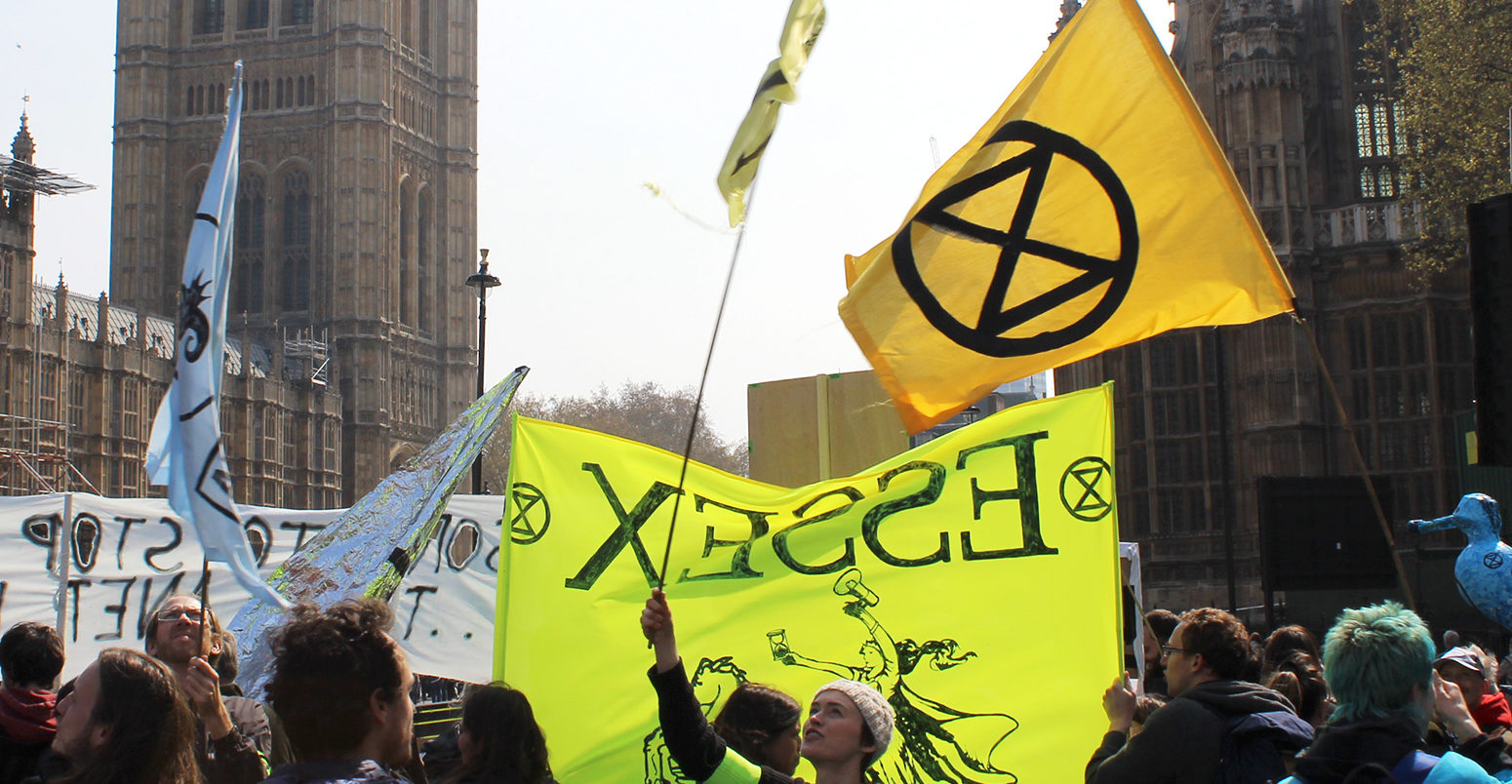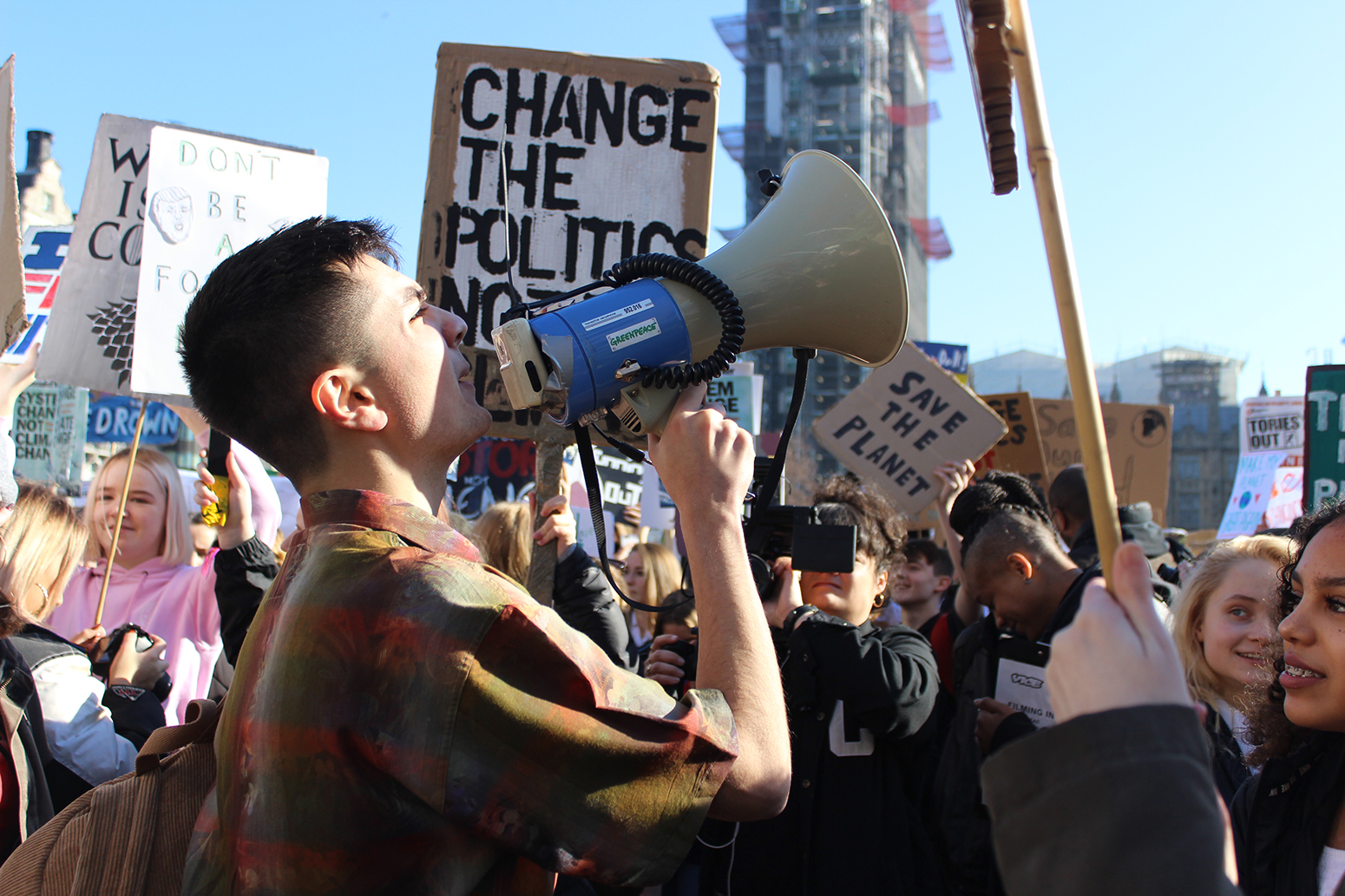
Guest post: Polls reveal surge in concern in UK about climate change

Leo Barasi
05.10.19
Leo Barasi
10.05.2019 | 12:05pmLeo Barasi is the author of The Climate Majority: Apathy and Action in an Age of Nationalism and blogs at Noise of the crowd.
Climate change has been unusually prominent in the UK media over recent weeks – and this is mirrored by a noticeable increase in climate “concern” in the polls.
From 15-25 April, climate change was high on the news agenda in response to the Extinction Rebellion protests in London, a major BBC documentary presented by Sir David Attenborough and the visit to London by the Swedish school climate protestor Greta Thunberg.
Data presented by Carbon Brief and the University of Colorado both found that the media mentioned “climate change” more in April than it did in almost any previous month.
Several research agencies have conducted opinion polls of the UK public since the protests started and have now published their results. This means we can see what effect the events of April, and the resulting media coverage, has had on public opinion.
Some of the polls also show what the public think about possible measures to cut emissions and how far people say they would change their own behaviour to limit climate change.
Rising concern
Separate polls point to a long-term rise in concern about climate change among the UK public, pre-dating the recent news. The proportion who say they are “very” or “fairly” concerned about climate change last year reached its highest point since 2008.
New data from a poll commissioned by the UK’s Department for Business, Energy & Industrial Strategy (BEIS), conducted in March – before the recent media attention to climate change – found that concern about climate change was already at its highest level since the polling series began in 2013.
A comparison with other polls that asked the same question suggests concern in March was higher than at any point since at least 2008, as shown in the chart, below.
Respondents’ level of concern about climate change in polls between 2008 and early 2019, ranging from “very concerned” (dark red) through to “not at all” (dark blue). Polls carried out by MORI, Opinium, BEIS and its predecessor DECC. Source: Noise of the Crowd. Chart by Carbon Brief using Highcharts.Many polls, across a range of different research agencies, measure public concern about climate change in the UK.
However, a recent study published in the journal Climatic Change showed that apparent acceptance of climate science among the US public is heavily affected by the wording of the question.
The advantage of the question used in the BEIS poll, and shown above, is that it has been asked in the same way for several years – including by other agencies in separate polls – making it possible to confidently identify changes in opinion.
Other pollsters have found a similar trend. Both YouGov and Ipsos MORI regularly ask the public which issues they consider to be the most important facing the UK at the moment. The “environment” has tended to be quite low on the list, with less than 10% typically selecting it among their top three.
But both pollsters have found a shift over the past 18 months. In YouGov’s data, the last three polls of 2017 found 9% picking the environment among their top issues; but in the three polls before mid-April – before the recent news surge – 17% did so. Ipsos MORI also recently saw the highest concern about the environment in over a decade.
The same measure shows a sudden jump in concern in late April. According to a YouGov poll conducted from 29-30 April, 24% put the environment among their top issues facing the country. This puts it at about the same level as the economy and immigration.
Ranking of issues considered the most important facing the country at this time, in polls carried out between 2010 and the end of April 2019. Respondents can select up to three issues. These are then ranked according to the share of respondents selecting each issue. Source: YouGov and Carbon Brief analysis. Chart by Carbon Brief using Highcharts.This rapid increase in concern is unusual. When I studied the impact of UN conferences, IPCC reports, extreme weather events and public protest from 2006-2014 for my master’s dissertation, I found only one example of public concern about the environment changing so quickly – a spike following major floods across many parts of the UK (perhaps, most notably in Somerset) during the winter of 2013/14.
Climate emergency
Recent polls also suggest that much of the UK public shares Extinction Rebellion’s concern. The polls were conducted online or by mobile phone by several agencies, all of which belong to the British Polling Council, which requires its members to disclose their methods and results.
A poll by Opinium, conducted during the protests, found 63% agreeing – including 25% strongly agreeing – with the statement: “We are facing a climate emergency.” The question found slightly greater concern among women, with 67% agreeing. Younger people, aged under 35, were also more likely to agree: 69% supported the statement, compared with 59% of those over 55. In the BEIS poll, 69% said climate change is already having an impact on the UK.
Another poll, by ComRes, conducted after the protests had finished, included a pair of questions that point to a similar conclusion. The poll tested several statements, including:
“I believe that climate change threatens our extinction as a species.”
And…
“I do not believe that climate change threatens our extinction as a species, but it does need to be tackled.”
The first of these reflects Extinction Rebellion’s position, while the second sounds like the sort of measured compromise favoured by some conservative commentators.
Strikingly, despite being offered a more extreme statement and a milder compromise, the public are much more likely to agree with the stronger statement. ComRes found that 54% agree climate change threatens human extinction, with only 25% disagreeing. In contrast, only 39% agree with the compromise statement, with 47% disagreeing.
Behaviour change
The protestors called for the UK’s carbon emissions to become “net-zero” by 2025 and, in principle, the public agree. But that does not mean they would necessarily back the changes that would be needed to make it happen.
For example, a poll by Sky Data, conducted during the protests, found that 60% approve of Extinction Rebellion’s 2025 target. Meeting this goal would require significant behaviour change and, indeed, the Opinium poll found that 66% agree with the statement: “I would be willing to make personal sacrifices for the climate as long as I knew others were doing the same.”
The polls also found widespread support for some government policies that could help achieve this transformation. In the Opinium poll, 77% said they would support the government investing more heavily in renewables, while 57% said they would support a move to “stop giving aviation tax breaks”.
The same poll also found clear majorities for clean incentives and subsidies, such as for home insulation, electric cars and public transport. The BEIS poll also found support for solar and wind energy is at record levels.
Wow, there’s record support from the British public for onshore wind, at 79% in latest UK govt polling.
That support’s been growing steadily. Seems politically significant.
Only 6% opposed. pic.twitter.com/zqG2JPjvhf
— Simon Evans (@DrSimEvans) May 9, 2019
But other results suggest that aspects of a rapid decarbonisation do not yet have widespread public support. Where the polls asked respondents whether they would pay more or cut back on certain things to reduce emissions, they found a mixed response.
For example, a second Sky Data poll found that 40% say they would significantly reduce meat or give it up entirely to help combat climate change, a shift that may be needed to reduce the UK’s emissions. The same poll found fewer people say they would reduce the amount they drive or travel by plane: 28% for both changes. Likewise, the Opinium poll found 33% supporting a meat tax, with 39% opposing one.
Some other questions on the same themes found even more support. For example, the ComRes poll found 51% would “forego at least one overseas trip per year for the sake of the climate” – that is 23 percentage points more than told Sky Data they would “significantly reduce” their air travel or give it up entirely. The Opinium poll also found 75% said they might/would definitely eat less meat in the future to protect the environment and climate, or were already doing so. This is nearly twice the proportion that responded positively to Sky Data.
The difference in responses to these questions about personal behaviour change seem to reflect the implication of how disruptive the shift would be. When a change to something such as meat eating or flying is phrased as a “significant” reduction, most people are reluctant. But when the quantity is specified or it is simply presented as meaning people would do it “less”, there is much more support.
-
Guest post: Polls reveal surge in concern in UK about climate change
-
54% of UK respondents agree that climate change threatens human extinction (ComRes)


